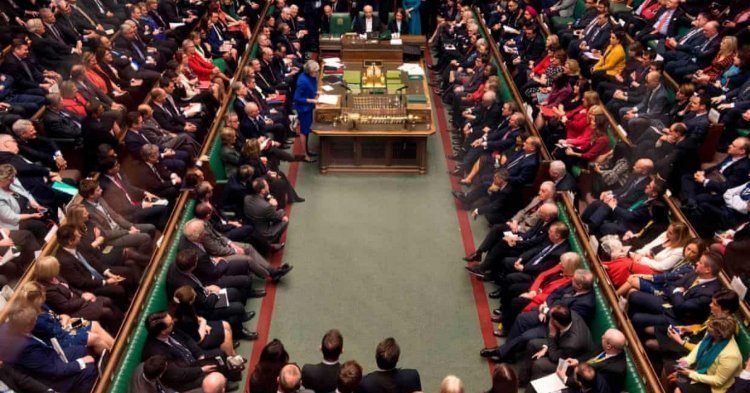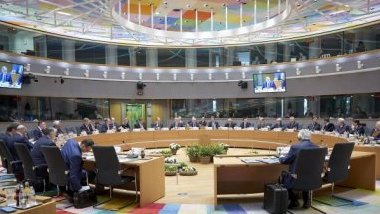A “renegotiated” deal swept away
After rejecting the withdrawal agreement last January, the British MPs had tasked their Prime Minister with the role of obtaining concessions from the European Union on the tricky question of the backstop, very sensitive element of the divorce deal.
On 11 March in Strasbourg, the day before the second vote on the text, Theresa May complied, and came back to London with an interpretative text meant to reassure the Commons that the unpopular backstop won’t be forever. If the Union acted on bad faith with the aim of maintaining this mechanism, the United Kingdom “would have the right to enact a unilateral, proportionate suspension of its obligations”. This last-minute declaration received the support of neither Labour nor of the DUP, the Northern Irish party which provides essential support to Theresa May’s government. Theresa May’s hopes of winning the vote on the deal were quashed as Geoffrey Cox, Attorney General (and thereby chief legal advisor) of the British government declared that a risk remained for the backstop to persist indefinitely.
This succession of events led on 12 March to a second rejection from the British Parliament to giving its approval to the withdrawal agreement, by 391 votes against 242, inflicting a second defeat to Theresa May.
A chaotic succession of votes
The victory of the ‘no’ on Tuesday led on Wednesday evening to a vote on the possibility of a no-deal Brexit on 29 March, proposed by the government. An amended version of the government’s motion affirmed the British Parliament’s will to oppose the eventuality of a no-deal, with 321 votes against 278.
This rejection of a no-deal led to a quick reaction from the European Union. One of its spokespersons declared that “it’s not enough to vote against no-deal – you have to agree to a deal”. Theresa May followed this position, and hoped to be able to organise a third vote on the withdrawal agreement before the European Council of 21-22 March, to then ask for an extension to article 50 to the EU-27, with a “credible and convincing justification”. However, as noted in the introduction, this Monday the Speaker John Bercow vowed to reject a new vote on the same deal.
On Thursday night, the British government won a battle (although a bitter one, after a chaotic week): the MPs accepted with 412 votes against 302 the eventuality of a short extension of the Brexit – in the event that a deal were agreed, until 30 June, before the official entry into function of the next European Parliament (the European elections will be held in the end of May). In the event that there is no agreement on a deal, the extension would be so long as to require the UK to hold European elections in May. Any extension will have to be unanimously accepted by the 27 EU member states during this week’s summit.
The evening of 14 March was also marked by the rejection of the option of a second referendum on EU membership. This possibility would equally require a long extension of Article 50, and thus would force the UK to hold European elections, at a risk of causing significant legal problems for the next European Parliament. (Translator’s addition: However, this rejection came as Labour whipped its MPs to abstain from the vote, and some lead figures in the campaign for a People’s Vote urged MPs to save their strongest effort to push for a public vote to this week.)
A plethora of scenarios
So, at the start of a new decisive week, what should we expect? Without taking the risk of hasty speculations and conclusions, let’s simply try to understand the different scenarios which could be looming in the upcoming days.
The week had been expected to start with a third “meaningful vote” on the agreement, either on Tuesday or Wednesday. However, John Bercow’s statement from today complicates matters significantly. If the British government is supported by the Parliament (which is unhoped for but, if there is to be a deal, necessary), Theresa May will be able to go to the European summit in Brussels on 21-22 March with a convincing argument in favour of a short extension to Article 50. Last Monday, in Strasbourg, Jean-Claude Juncker had already mentioned the question of a short-term extension, suggesting the deadline of 22 May, the day before the European elections. The deadline of 30 June was already evoked: as the new European Parliament will take office on the 2nd of July, this would avoid any illegality of this Parliament in the absence of British MEPs.
If the question of a short extension seems acknowledged on the EU side – even if unanimity is required at the summit to grant it – no country would take the risk to block alone this British demand (the one of a longer extension was also under vivid discussion even before Monday). The President of the European Council, Donald Tusk, affirmed that he was considering to propose this option to the member states “if the UK finds it necessary to rethink its Brexit strategy and build consensus around it”.
However, this option of an extension of several months poses legal and political problems. The Financial Times accessed a European preparation document of the summit, mentioning this scenario. This perspective indeed implies that the UK will participate in the EU elections, in order for the next European Parliament’s action not to be charged with illegality, which would block the European action. The British participation to the election thus seems inevitable if the option of a long extension is foreseen. However, no one has prepared for organising European elections in the UK, and the EU elections will take place in a bit more than two months: neither the organisers of the elections nor the parties are ready. This eventuality leads some jurists such as Eleanor Sharpston, Advocate General at the Court of Justice of the European Union, to consider that the House of Commons could send some of their members to sit in Strasbourg (this mechanism actually existed before the European Parliament became directly elected by the citizens, i.e. before 1979).
Beyond these legal questions, a long extension would see the UK remaining a member of the EU, which raises the question of its participation in the negotiations, its contribution to the next multiannual budget, but also the next appointments at strategic positions. The trade negotiations which are to be held after Brexit are also pending, as highlighted by Michel Barnier in the same documents.
Among all these ‘optimistic’ scenarios, the possibility of a Remain is still weak, although attractive. The Court of Justice of the EU considered on 10 December 2018 that article 50, triggered unilaterally, could be revoked in the same way (under certain conditions).
One could think that such a scenario would necessitate another referendum, in order to respect the Brits’ choice whose opinion triggered the divorce procedure in March 2017. This eventuality should not be swept away: of course, we should not welcome the UK with open arms if they finally wish to remain a member of the EU. But we should not close the door either if, almost three years after the referendum of 23 June 2016, the British people finally opted for Remain.
This would be a denial of the very essence of the Union’s purpose: a European Federation. This ambition would also require a much-strengthened commitment of the UK in the European construction, for Article 50 not to be triggered again. Otherwise, the Brexit would eternally remain the British ouroboros… [Translator’s note: an ouroboros is an ancient symbol depicting a snake biting its own tail.]





Follow the comments: |
|
